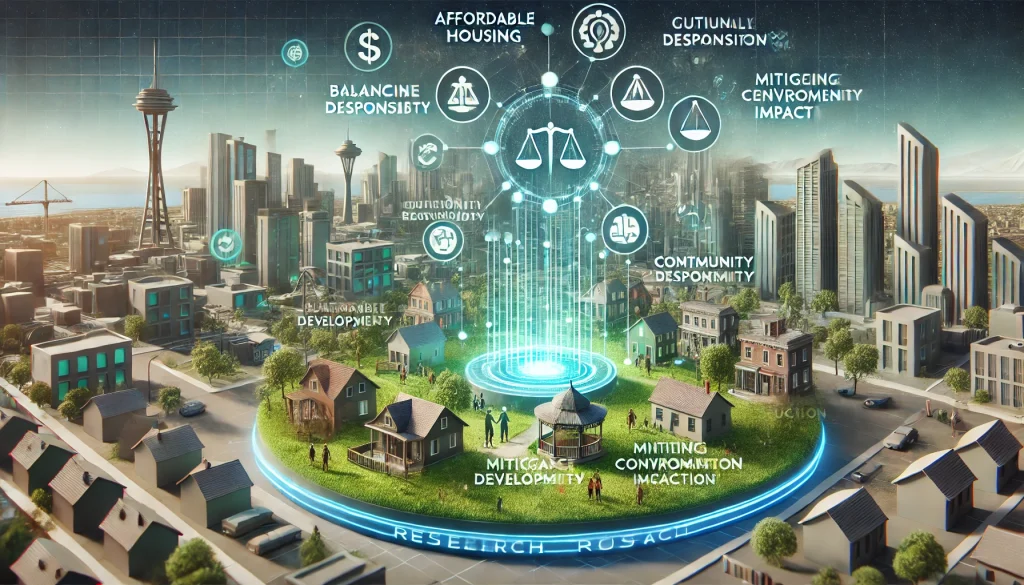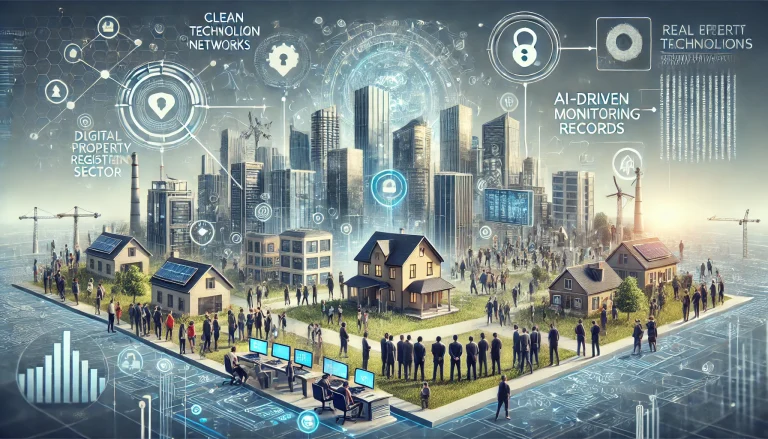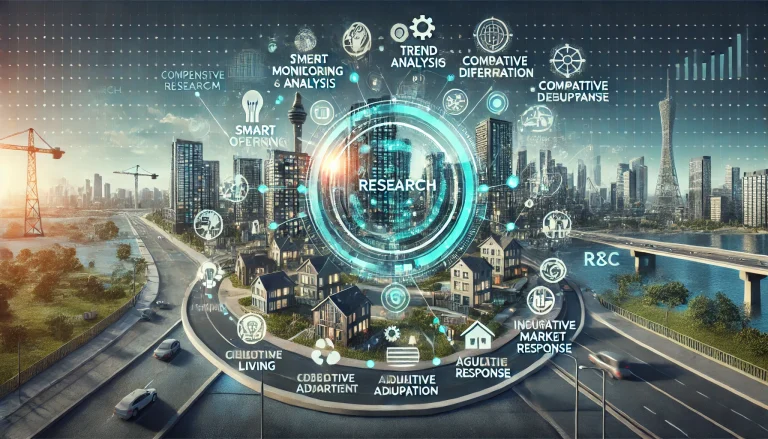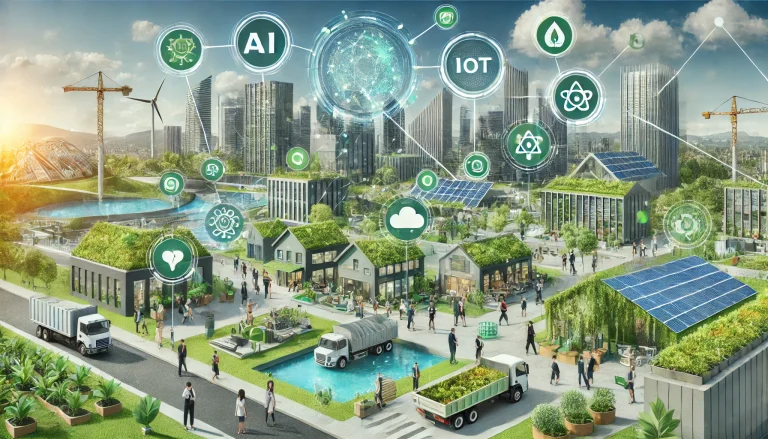Problem Statement
Real estate developments have the potential to bring about significant changes in local communities, both positive and negative. While new developments can stimulate economic growth, create jobs, and provide much-needed housing and amenities, they can also lead to challenges such as displacement of long-term residents, environmental degradation, and alterations to the character of the neighborhood. These changes can generate resistance from local communities and create tensions between developers and residents.
For real estate companies, managing community relations effectively is crucial to the success of their projects. Companies must ensure that their developments contribute positively to the area, addressing concerns raised by residents and other stakeholders. This requires a commitment to transparency, ongoing dialogue, and a willingness to adapt plans based on community feedback. Failing to do so can result in project delays, legal challenges, and damage to the company’s reputation.
Displacement is a particularly sensitive issue, as new developments can drive up property values and rents, making it difficult for long-term residents, particularly those from lower-income backgrounds, to remain in the area. This can lead to the erosion of social ties, loss of cultural diversity, and gentrification, which may be perceived negatively by the community.
Environmental impact is another key concern. Real estate developments can affect local ecosystems, contribute to pollution, and increase the carbon footprint of the area. Companies must be mindful of these impacts and incorporate sustainable practices into their projects to minimize harm to the environment.
Changes in local character and identity can also be contentious. Communities often value their unique character and history, and new developments that are perceived as out of sync with these values can face strong opposition. Companies need to consider the cultural and social fabric of the area and ensure that their projects complement rather than disrupt the existing community.
Building strong relationships with community stakeholders, including residents, local businesses, and government agencies, is essential for navigating these challenges. By engaging with the community early and often, real estate companies can foster goodwill, gain valuable insights, and create developments that are welcomed by the community.
Pain Points
- Displacement of Long-Term Residents: Rising property values and rents can lead to the displacement of lower-income residents.
- Environmental Impact: Real estate developments can harm local ecosystems, contribute to pollution, and increase the carbon footprint.
- Changes in Local Character: New developments can alter the cultural and social fabric of a community, leading to opposition from residents.
- Community Resistance: Lack of engagement and transparency can lead to resistance and opposition from the community.
- Balancing Profit with Social Responsibility: Companies must balance the need for profitability with the responsibility to contribute positively to the community.
- Managing Community Relations: Building and maintaining strong relationships with community stakeholders is essential but challenging.
- Sustainability Practices: Incorporating sustainable practices into developments to minimize environmental impact.
- Gentrification Concerns: Addressing concerns related to gentrification and ensuring that developments benefit all residents, not just newcomers.
- Transparency and Communication: Maintaining open and transparent communication with the community throughout the development process.
- Cultural Sensitivity: Ensuring that developments respect and preserve the cultural and historical identity of the community.

Future Vision
Our platform envisions a future where real estate developments are designed and executed with a deep understanding of and respect for the communities they impact. By prioritizing community engagement, sustainability, and cultural sensitivity, real estate companies can create developments that contribute positively to the area, address concerns, and build strong relationships with community stakeholders.
A key focus will be on preventing displacement and fostering inclusivity. The platform will support real estate companies in developing strategies that prevent the displacement of long-term residents, such as offering affordable housing options, preserving existing community resources, and investing in local infrastructure that benefits all residents. Companies will be encouraged to adopt mixed-income development models that cater to a diverse range of income levels, ensuring that new developments do not exacerbate social inequalities.
Sustainability will also be at the forefront of the platform’s recommendations. Real estate companies will be guided in incorporating sustainable practices into their projects, from using eco-friendly building materials to implementing green energy solutions and minimizing the environmental footprint of their developments. This will not only help protect the environment but also align with the growing demand for sustainable living options among consumers.
Cultural sensitivity and respect for local character will be integral to the platform’s approach. Companies will be encouraged to engage with local residents, cultural organizations, and historians to ensure that new developments reflect and preserve the unique identity of the community. This could involve incorporating local architectural styles, preserving historical landmarks, and creating public spaces that celebrate the area’s cultural heritage.
Community engagement will be central to the platform’s strategy. Real estate companies will be supported in establishing transparent and ongoing communication with community stakeholders, from the initial planning stages through to project completion. This includes conducting public consultations, soliciting feedback, and being responsive to community concerns. By involving the community in the development process, companies can build trust, foster goodwill, and create projects that are more likely to be embraced by the residents.
Balancing profit with social responsibility will be another key consideration. The platform will provide tools and frameworks to help companies achieve financial success while also contributing positively to the community. This includes strategies for creating shared value, where the economic benefits of the development are aligned with social and environmental goals.
By addressing these challenges and prioritizing community-centric development strategies, real estate companies can create projects that not only succeed financially but also enhance the well-being and sustainability of the communities they serve. This approach will help build stronger, more resilient neighborhoods and position companies as responsible and ethical leaders in the industry.
Use Cases
- Affordable Housing Initiatives: Developing mixed-income housing projects that prevent displacement and cater to diverse income levels.
- Sustainable Development Practices: Incorporating eco-friendly building materials, green energy solutions, and other sustainability practices into real estate projects.
- Cultural Preservation and Integration: Designing developments that reflect and preserve the cultural and historical identity of the community.
- Community Engagement Strategies: Establishing transparent and ongoing communication with community stakeholders, including public consultations and feedback loops.
- Balancing Profit and Social Responsibility: Implementing strategies that align economic success with social and environmental goals.
- Mitigating Environmental Impact: Developing projects that minimize environmental harm and contribute to local ecosystem preservation.
- Gentrification Management: Addressing gentrification concerns by offering affordable housing, preserving local businesses, and investing in community infrastructure.
- Public Space Creation: Designing public spaces that serve as community hubs and celebrate the area’s cultural heritage.
- Transparency and Accountability: Maintaining open communication and being accountable to the community throughout the development process.
- Building Strong Community Relations: Fostering strong relationships with residents, local businesses, cultural organizations, and government agencies to ensure long-term success.
Target Users and Stakeholders
- User: Real Estate Developers, Urban Planners, Community Relations Managers, Corporate Social Responsibility Officers, and Sustainability Officers
- Age Group: 30-60 years
- Gender: M/F
- Usage Pattern: Regular usage for planning, designing, and managing real estate projects with a focus on community impact, sustainability, and cultural sensitivity
- Benefit: Enhanced community relations, improved social outcomes, and sustainable, culturally sensitive developments that balance profitability with social responsibility
- Stakeholders:
- Real Estate Companies: Developers and property managers involved in projects that impact local communities.
- Local Communities: Residents, cultural organizations, and local businesses that are affected by new developments.
- Government and Regulatory Bodies: Agencies responsible for urban planning, housing policy, and environmental regulations.
- Environmental Organizations: Groups advocating for sustainable development and environmental protection in urban areas.
- Cultural Preservation Groups: Organizations dedicated to preserving the cultural and historical identity of communities.
- Investors: Individuals and institutions investing in real estate projects with a focus on social impact and sustainability.
Key Competition
- L+M Development Partners: Known for its commitment to affordable housing and community engagement in urban development projects.
- Related Companies: Invests in sustainable development practices and works to integrate new projects into the existing community fabric.
- Jonathan Rose Companies: Focuses on socially responsible real estate developments that prioritize community impact and sustainability.
- Forest City Realty Trust: Engages in urban development projects that balance economic growth with environmental stewardship and cultural preservation.
- Silverstein Properties: Works on large-scale urban developments with a focus on building strong community relations and preserving local character.
Products/Services
- L+M Affordable Housing Initiatives: Developing mixed-income housing projects that prevent displacement and cater to diverse income levels.
- Related Companies Sustainable Development: Incorporating eco-friendly building materials, green energy solutions, and other sustainability practices into real estate projects.
- Jonathan Rose Companies Cultural Preservation: Designing developments that reflect and preserve the cultural and historical identity of the community.
- Forest City Community Engagement Strategies: Establishing transparent and ongoing communication with community stakeholders, including public consultations and feedback loops.
- Silverstein Properties Social Responsibility: Implementing strategies that align economic success with social and environmental goals.
Active Startups
- InclusiveDev: Specializes in developing affordable and inclusive housing projects that prevent displacement and foster community integration.
- GreenBuild: Focuses on sustainable development practices, including eco-friendly building materials and green energy solutions.
- CivicEngage: Provides tools and platforms for real estate companies to engage with communities, solicit feedback, and maintain transparency.
- CulturePreserve: Specializes in designing developments that reflect and preserve the cultural and historical identity of communities
- EcoImpact: Innovates in environmental impact assessment and mitigation strategies for real estate developments.
- SocialProp: Focuses on creating shared value in real estate projects, aligning profitability with social and environmental goals.
- CommunityRoots: Develops tools and strategies for building strong relationships with community stakeholders, including residents, businesses, and cultural organizations.
- UrbanRevitalize: Specializes in urban redevelopment projects that prioritize sustainability, cultural preservation, and community well-being.
- EnviroSafe: Provides environmental safety and sustainability consulting services for real estate developers.
- NeighborConnect: Offers platforms for facilitating ongoing communication and collaboration between real estate companies and local communities.
Ongoing Work in Related Areas
- Affordable Housing Research: Exploring new models for developing and financing affordable housing in urban areas to prevent displacement.
- Sustainable Development Innovations: Researching and developing new materials, technologies, and practices that promote sustainability in real estate.
- Cultural Preservation Strategies: Developing best practices for preserving cultural heritage and community identity in urban development.
- Community Engagement Models: Innovating new methods for involving local communities in the planning and decision-making processes of real estate projects.
- Environmental Impact Mitigation: Researching strategies for minimizing the environmental impact of real estate developments and preserving local ecosystems.
- Shared Value Creation: Exploring models for aligning economic success with social and environmental goals in real estate projects.
- Public-Private Partnerships: Developing new models for collaboration between real estate companies, governments, and community organizations to promote inclusive development.
- Transparency and Accountability Tools: Innovating tools and platforms that enhance transparency and accountability in real estate development.
- Civic Engagement Platforms: Creating digital platforms that facilitate ongoing communication and collaboration between real estate developers and local communities.
- Urban Redevelopment Strategies: Researching best practices for revitalizing urban areas in a way that balances economic growth with community well-being.
Recent Investment
- InclusiveDev: $30M in Series A funding led by impact investment firms focused on affordable housing, January 2021.
- GreenBuild: $25M in Seed funding from sustainability-focused venture capital firms, March 2020.
- CivicEngage: $20M in Series B funding from real estate technology investors, June 2021.
- CulturePreserve: $15M in Series A funding from cultural preservation and community development investors, September 2020.
- EcoImpact: $12M in Seed funding from environmental impact-focused investment firms, December 2020.
Market Maturity
The market for community-centric real estate development is rapidly maturing as companies and investors recognize the importance of balancing profitability with social responsibility, environmental sustainability, and cultural sensitivity. Companies like L+M Development Partners, Related Companies, and Jonathan Rose Companies are leading the way with affordable housing initiatives, sustainable development practices, and cultural preservation strategies. Startups such as InclusiveDev, GreenBuild, and CivicEngage are driving innovation in inclusive housing, sustainability, and community engagement platforms. Significant investments in affordable housing research, sustainable development innovations, and cultural preservation strategies are transforming the real estate industry, enabling companies to create developments that contribute positively to local communities and build strong, long-lasting relationships with stakeholders. As the market continues to evolve, we expect to see more integrated and advanced solutions that enhance community impact and position real estate companies as leaders in responsible and ethical development.
Summary
Real estate developments can significantly impact local communities, leading to both positive and negative outcomes. Companies must manage community relations carefully, ensuring that their projects contribute positively to the area and addressing concerns such as displacement, environmental impact, and changes in local character. Building strong relationships with community stakeholders is essential for the long-term success of real estate projects. Our proposed platform leverages affordable housing initiatives, sustainable development practices, cultural preservation and integration, community engagement strategies, balancing profit and social responsibility, mitigating environmental impact, gentrification management, public space creation, transparency and accountability, and building strong community relations to address these challenges. Key pain points include displacement of long-term residents, environmental impact, changes in local character, community resistance, balancing profit with social responsibility, managing community relations, sustainability practices, gentrification concerns, transparency and communication, and cultural sensitivity.
Target users include real estate developers, urban planners, community relations managers, corporate social responsibility officers, and sustainability officers, with stakeholders encompassing real estate companies, local communities, government and regulatory bodies, environmental organizations, cultural preservation groups, and investors. Key competitors like L+M Development Partners, Related Companies, Jonathan Rose Companies, Forest City Realty Trust, and Silverstein Properties offer various affordable housing initiatives, sustainable development practices, cultural preservation strategies, community engagement strategies, and social responsibility frameworks, while startups such as InclusiveDev, GreenBuild, and CivicEngage are driving innovation in inclusive housing, sustainability, and community engagement platforms. Recent investments highlight significant interest and growth potential in platforms addressing the challenges of community-centric real estate development.
By addressing these challenges and prioritizing community-centric development strategies, real estate companies can create projects that not only succeed financially but also enhance the well-being and sustainability of the communities they serve. This approach will help build stronger, more resilient neighborhoods and position companies as responsible and ethical leaders in the industry.



